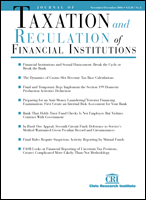Harley-Davidson, Factor Presence Nexus, and Market Sourcing: How California’s Expansive and Evolving Definitions of “Financial Corporations” and “Doing Business” Create Unforeseen Hazards for Taxpayers
Author: John Harper.; Marianne Evans.; Rick Najjar.
Source: Volume 29, Number 03, January/February 2016 , pp.19-32(14)

< previous article |next article > |return to table of contents
Abstract:
In today’s business environment, many corporate groups include one or more subsidiaries that are formed solely to conduct financial activities. Likewise, many banks and other financial organizations have formed subsidiaries or affiliates that conduct nonfinancial activities. This article provides an overview of California’s taxation of general corporations as compared to its taxation of financial corporations. Using the hypothetical facts of a retailer that forms financial organizations to manage the process of financing retail purchases, the article examines how a group that includes both financial and nonfinancial organizations must report taxes in California. The article further examines how use of a special purpose entity to securitize a loan portfolio can create additional issues for the hypothetical group. The purpose of the article is to assist taxpayers to avoid pitfalls that can result from lack of understanding of the rules. © 2016 KPMG LLP.Keywords: nexus, apportionment, income-sourcing rules, California-source income, unitary business groups, special purpose entities, financial vs. general corporation
Affiliations:
1: KPMG LLP; 2: KPMG LLP; 3: KPMG LLP.